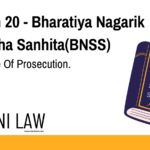Section 441A CrPC: Declaration by Sureties
This section of the Code of Criminal Procedure (CrPC) deals with the declaration required to be made by sureties when a person is released on bail.
1. The Code
Section 441A states that when a person is released on bail, the sureties shall, at the time of executing the bond, declare in writing that they are aware of the conditions of the bond and that they will ensure the appearance of the accused person before the court as and when required.
2. Explanation
- The surety, by signing the bond, assumes responsibility for the accused’s appearance in court.
- The declaration ensures that the sureties are fully aware of their obligations and the consequences of non-compliance.
- This section aims to strengthen the bail system and prevent the accused from absconding.
3. Illustration
Suppose a person is granted bail on a condition that they must appear in court on a specific date. Their sureties, by signing the bond and making the declaration, are obligated to ensure that the accused person attends the court hearing. If the accused fails to appear, the sureties may be held liable.
4. Common Questions and Answers
Q: Who can be a surety?
A: Any person who is of sound mind and has sufficient financial means can be a surety. Usually, it is a close relative or friend of the accused.
Q: What are the consequences if a surety fails to ensure the accused’s appearance?
A: The court may issue a warrant for the surety’s arrest and may also forfeit the amount of the bond.
Q: Can a surety withdraw their guarantee?
A: Yes, a surety can apply to the court to withdraw their guarantee. However, the court will consider the circumstances and may not allow it if it feels the accused might abscond.









